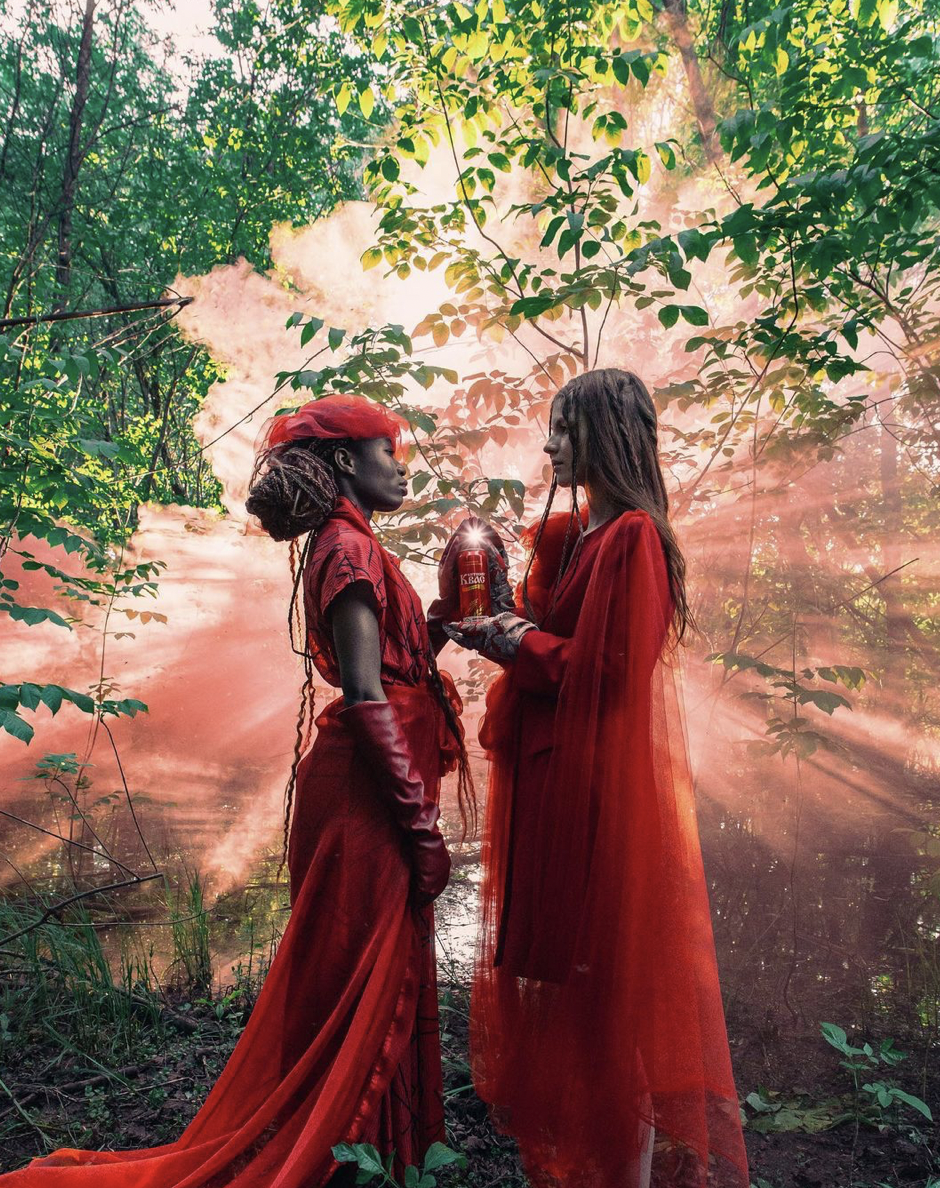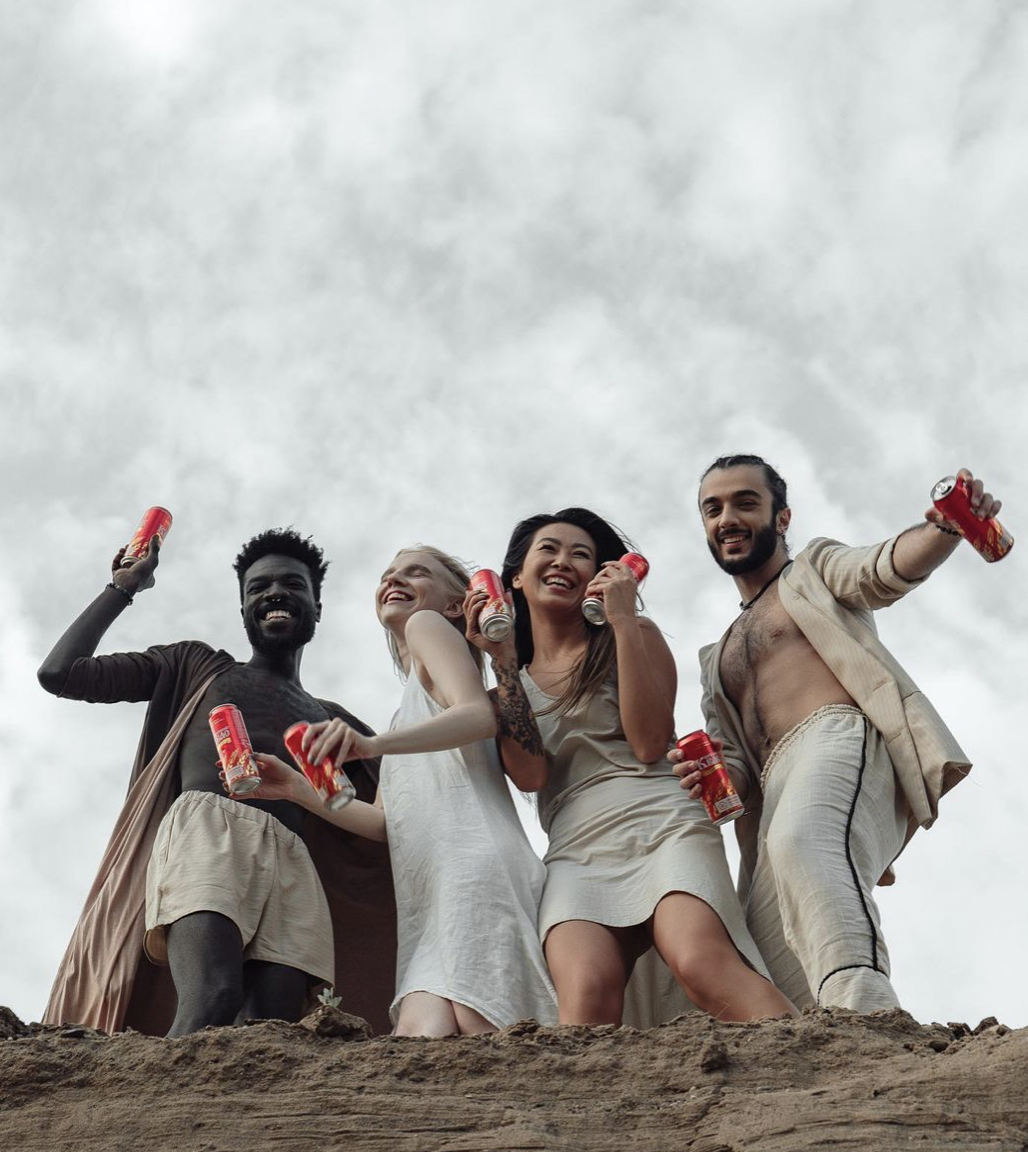How ‘Russia’s Coca-Cola’ took on a racist cult and won
The brewer of a traditional drink decided to look beyond its history and became an unlikely warrior for inclusivity, reports Oliver Carroll from Kirov


For six years, they terrorised feminists, gays and black people; anyone who did not fit their extreme worldview. Their campaign of online and offline violence mostly went unchecked. At times, it appeared to have the tacit approval of parts of the Russian state. But this week, the group of vigilantes that called itself Male State met its match.
Formally, it was a judge in Nizhny Novgorod who delivered the group’s death blow, consigning the organisation and its founder Vladislav Pozdnyakov to the country’s extremist register on Monday. But responsibility for the victory belongs elsewhere – in Kirov, a small provincial town 500 miles northeast of Moscow, and to Vyatsky Kvass, the makers of a traditional Russian fermented drink called kvass.
It was Vyatsky Kvass’s bold advertising campaign with local black and Asian models that first drew national attention to the problem of the racist vigilantes. And it was its brave, 4 October public call for action that triggered state prosecutors to finally open a case.
“Vyatsky Kvass has beaten the Male State!” read the company’s immediate Instagram response to the court verdict.
“We did it thanks to you – to anyone who has suffered at the hands of trolls and bullies!”
To understand why a fermented drinks manufacturer in Kirov took on Russia’s nationalistic underbelly – and won – you have to begin by telling the story of kvass itself.

First mentioned in the chronicles of Kievan Rus, the dark, naturally fizzy nectar is older than Russia itself. It’s made by brewing rye and barley with yeasts and sugar. At its most delicious, it’s served chilled from kegs or yellow trucks that line Russian streets in the summer.
Kvass is to Russia what Coca-Cola is to the United States; a potent symbol of national tradition. In the 19th century, Russia’s liberal westernisers used it as a derogatory adjective to criticise the conservatism of their Slavophile opponents. In their view, “kvass patriotism” meant backwardness and blind national loyalty.
But Vyatsky Kvass has an altogether different vision of the product, seeing its future as a “modern” drink with pride of place alongside kombucha, another fermented beverage with Russian origins. That conviction led the company to an idea for a bold ad campaign to move kvass past its traditional audiences – spearheaded by Benedicta Kokor, 25, a black student from Ghana now three years into a medical degree in Kirov.
They don’t see the insidiousness of it all — that one day you attack LGBT, the next you do blacks, and then you are on to every one of the hundred or so nations of Russia
On 8 June, Vyatsky Kvass released a dazzling new photoshoot showing Kokor as the exotic new face of its brand. No one, least of all Kokor herself, was ready for clearly coordinated hate responses that followed. Vomiting emojis were among the more diplomatic.
Talking quietly, yet radiating toughness, Kokor recalls those “worrying” days. Friends warned her not to look at the comments, she says. She looked anyway. “I’m used to everyday, casual racism, and have a thick skin since I know people don’t know better, but this was just, woah. I was stunned. The hate was beyond my comprehension.”
Male State was only just beginning its assault on Vyatsky Kvass.
In the days and weeks that followed, the online cult bombarded the company with thousands of letters, dozens of phone calls, and attempted to bring down its website. They made explicit threats to both Benedicta and the company’s owners.
“We didn’t ask for a fight,” says Vladimir Mamatov, the public face of Vyatsky Kvass’s management team.
“But these were red lines for us, and we had to do something.”

The company’s immediate response was to delve into the racists’ world. They began tracking the threatening comments, and their authors. At the same time, they also began talking to Kirov’s small but growing foreign-born community. A senior manager says she felt exposed to a new world: “You felt just how unprotected these guys really are.”
More research crystallised thinking around a new ad campaign, which the company coined “racism online.” The idea was simple: to champion more black and Asian personalities in Kirov, photographing them and interviewing them about their lives and everyday experience of xenophobia. The project went live in mid-September to widespread acclaim – and predictable trolling.
Sultan Ali Abakah, 30, one of the stars of that second ad campaign, tells The Independent he didn’t have to think long about the offer to take part. Like many other foreigners in Kirov, he had seen Vyatsky Kvass’s “inspiring” ad campaign with Kokor – and the hateful response it provoked. “When you see others so uncowed, it helps you lose your own fear,” he says. “I’m also a fan of kvass, which helps!”
Ali Abakah says he now has a settled, happy life in Kirov, the co-owner of a popular barbershop – opened, he jokes, in response to the “awful haircuts” on display in town. But it wasn’t always as straightforward. When he first stepped off a plane from Sudan in 2012, he thought he’d find tolerance in the country that defeated fascism. He couldn’t be more wrong. There were regular fights, brandished knives, and many hurtful words. A man once approached him on a bus just to punch him in the stomach.
“There were times I asked myself: ‘what have you done?’,” he says.
The barber wasn’t surprised Male State attracted a mass following – hundreds of thousands signed up to its apps before it was blocked by Google and Apple on 12 October. “They put this equal sign between LGBT, BLM and feminists, and people get conned by the simplicity of it,” Ali Abakah says. “They don’t see the insidiousness of it all – that one day you attack LGBT, the next you do blacks, and then you are on to every one of the hundred or so nations of Russia.”

Male State may have had more time to test that slippery slope had it limited itself to attacking underprotected minorities. The group’s downfall came from its own hubris in taking on Russian companies. Vyatsky Kvass was not the only company to be targeted. Over the summer, Male State also attacked two sushi companies Yobidoyobi and Tanuki, who used black models in their ads. Pozdnyakov personally encouraged his followers to place ghost delivery orders with both companies.
A week after the first Vyatsky Kvass campaign, Vkusvil, a health foods supermarket, launched its own inclusivity ad campaign, which featured a lesbian family. The public reaction was largely positive. But the campaign came under assault from Male State and no less fierce champions of Kremlin “traditional values” policy like RT’s editor-in-chief Margarita Simonyan. Vkusvil buckled and apologised for the “unprofessionalism of certain employees.” The supermarket was accused of cowardice and hypocrisy. The family was forced to emigrate to Spain.
Ali Abakah says he convinced himself Vyatsky Kvass would be forced into a similar climbdown. “I didn’t for a second doubt they would take our photos down too,” he says.
The message we are trying to get across is that Kvass is for everyone, that it brings the nation together. If we start restricting it to one group of people, we deny ourselves our main idea
The architect of Vyatsky Kvass’s inclusive campaign is many things, but foolish isn’t one of them. Vladimir Mamatov talks fast, projects warmth, and has an eye for an opportunity. In 2014, he became the uninvited star of Vladimir Putin’s annual press conference, registering as a local reporter from Kirov, then grabbing a microphone intended for a Turkish journalist sitting behind him. He asked the president how he intended to support small manufacturers like his own. In a second, he etched Vyatsky Kvass on the national consciousness.
The PR chief says the company’s campaign against racism was always a calculated risk. His job is “to monitor trends,” he says, and had sensed Male State’s time was up. The group had become too toxic for the Kremlin, he says. “It isn’t quite true to say that Male State was ever supported by the government. It was a situational relationship at best. By the start of 2021, Male State were definitely out on their own. I could see that.”
Mamatov decided to give the state a chance to deal with the racist misogynists on its own terms. He held back from writing official police reports – that would have been the “worst thing,” he says. Instead, he made a few calls to old contacts in the presidential administration. The absence of negative feedback served as a green light for his 4 October public demand for Male State to be investigated.
“If the timing wasn’t right, I’d have sensed it,” he says.

Mamatov concedes he might not have had the same confidence had the Vyatsky Kvass campaign touched on something as sensitive as LGBT+ rights. There were “gay propaganda” laws he had to keep in mind, after all. But he had “no doubt” he would have tried to chart a different course to Vkusvil.
“The message we are trying to get across is that kvass is for everyone, that it brings the nation together,” he says. “If we start restricting it to one group of people, we deny ourselves our main idea.”
It's an uncomplicated message, and one that would probably go unstated in the west. But in the increasingly intolerant public space of contemporary Russia, it stands out for its kindness.
Mamatov insists that all he is doing is asking Russians to look for the positivity that “already exists inside”. The Russian national idea was still a work in progress, he says, and it was important to guide it in an honourable direction.
“We’re in the middle of a painful transition. Our government is Asiatic. Our culture – European. On every level, Russia is still searching for itself.”

Ali Abakah says he is minded to staying in Russia for the foreseeable future. It’s much more exciting, dynamic than back home in Sudan – and “good people” are committed to making life better. He’d noticed real changes over nine years of living in Kirov. At the start, people would point and laugh at him. Now, they tend to be much more respectful.
“I think society is changing for the better, and ad campaigns like this prove it,” he says.
With Vyatsky Kvass now minded to extend its ad campaign to tackle the scourge of domestic racism, particularly the stigma encountered by citizens from the Caucasus, Benedicta Kokor says the attention from Russian corporates could not be more timely.
“The campaigns are much more than just pretty pictures,” she says. “They create awareness across Russia at a time that foreign students are being killed for their colour. I can’t describe to you how happy I was when Vyatsky Kvass decided to continue with their campaigns and stick up for us.”
Kokor says that the reactions she’s experienced since the fermented drink maker’s second ad campaign went online have been overwhelmingly positive.
“People still stare at me in the streets, sure, but it’s more that they aren’t sure if they’ve recognised me from somewhere,” she says. “The other day, one of them pointed at me, before running up to ask, ‘Aren’t you that amazing star from Instagram?’”




Join our commenting forum
Join thought-provoking conversations, follow other Independent readers and see their replies
Comments